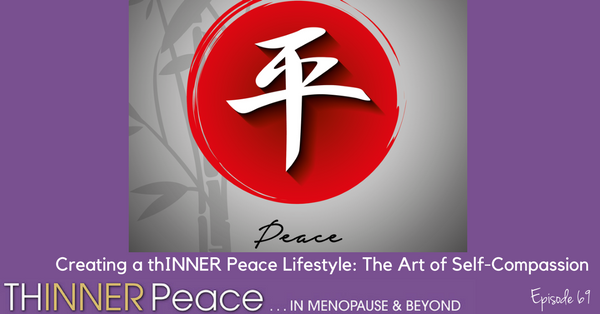
Today’s episode is all about how to create peace from the inside out. I show you how to start creating a peaceful mindset now using a powerful tool: Self-compassion. Most people know how to use compassion but have no idea how to use it for themselves.
If you want to lose weight in this phase of your life permanently, try starting from a peaceful state using the art of self-compassion. Most of us are STUCK in the habit of being so mean to ourselves and expecting positive results.
Read below what Dr. Kristen Neff has to say about this most important tool.
by Kristen Neff, PhD
Self-compassion entails being warm and understanding toward ourselves when we suffer, fail, or feel inadequate, rather than ignoring our pain or flagellating ourselves with self-criticism. Self-compassionate people recognize that being imperfect, failing, and experiencing life difficulties is inevitable, so they tend to be gentle with themselves when confronted with painful experiences rather than getting angry when life falls short of set ideals. People cannot always be or get exactly what they want. When this reality is denied or fought against suffering increases in the form of stress, frustration and self-criticism. When this reality is accepted with sympathy and kindness, greater emotional equanimity is experienced.
Frustration at not having things exactly as we want is often accompanied by an irrational but pervasive sense of isolation – as if “I” were the only person suffering or making mistakes. All humans suffer, however. The very definition of being “human” means that one is mortal, vulnerable and imperfect. Therefore, self-compassion involves recognizing that suffering and personal inadequacy is part of the shared human experience – something that we all go through rather than being something that happens to “me” alone.
Self-compassion also requires taking a balanced approach to our negative emotions so that feelings are neither suppressed nor exaggerated. This equilibrated stance stems from the process of relating personal experiences to those of others who are also suffering, thus putting our own situation into a larger perspective. It also stems from the willingness to observe our negative thoughts and emotions with openness and clarity, so that they are held in mindful awareness. Mindfulness is a non-judgmental, receptive mind state in which one observes thoughts and feelings as they are, without trying to suppress or deny them. We cannot ignore our pain and feel compassion for it at the same time. At the same time, mindfulness requires that we not be “over-identified” with thoughts and feelings, so that we are caught up and swept away by negative reactivity.
Enjoy the show!
Follow me on Facebook and see me live every Tuesday at 12 noon Eastern, 11 a.m. Central, 10 a.m. Mountain, 9 a.m. Pacific on Tuned in Tuesdays with Dr. Deb.
To get your free copy of the Thinner Peace in Menopause and Beyond Podcast Companion please go to https://drdebbutler.com/change. This will make it even easier to follow along with me on future podcasts.
If you like what I’m talking but think you need more guidance, I am offering a free consultation to my listeners to answer any questions you might have about anything I’ve talked about. Just go to https://drdebbutler.com/mini-session.
Please leave me an honest rating and review on iTunes at https://drdebbutler.com/itunes. It will help me reach more women who struggle with these issues. Here’s how to rate and review on iTunes: https://drdebbutler.com/rate. Thank you!
Did you enjoy this episode? Please share by clicking the like button below!